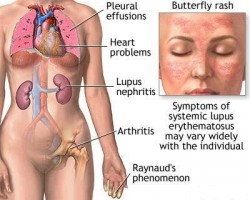 Systemic Lupus Erythematosus (SLE) is much more likely to occur in women. In fact, more than 90% of lupus patients are women between the ages of 15 and 45. Some researches believe it is because of the nature of lupus as an autoimmune disease. An autoimmune disease is a disease where the body’s own immune system attacks itself. Men produce hormones called androgens while the female body produces large quantities of estrogen. Estrogen is what is known as an immunoenhancing hormone, meaning it helps to strengthen the immune system. This hormone is produced by women during the menstrual cycle, as well as during pregnancy and when giving birth.
Systemic Lupus Erythematosus (SLE) is much more likely to occur in women. In fact, more than 90% of lupus patients are women between the ages of 15 and 45. Some researches believe it is because of the nature of lupus as an autoimmune disease. An autoimmune disease is a disease where the body’s own immune system attacks itself. Men produce hormones called androgens while the female body produces large quantities of estrogen. Estrogen is what is known as an immunoenhancing hormone, meaning it helps to strengthen the immune system. This hormone is produced by women during the menstrual cycle, as well as during pregnancy and when giving birth.
Each woman with lupus will experience different symptoms and the severity can range from low to high. The cause of lupus is unknown, but the autoimmune disease can be triggered by certain environmental factors and symptoms may come or go depending on the condition of your body. These moments when your SLE lupus symptoms arise are known as lupus flares.
There are many SLE lupus symptoms that are common to all lupus patients. Some of these symptoms include:
- fatigue and exhaustion
- aching and/or swollen joints
- body and facial rashes
- fever
There are some lupus symptoms that occur more often in women:
Osteoperosis
Women with lupus experience more bone loss than other women. The lupus disease itself can cause bone loss, but there may also be some medications that cause bone loss as well. The exhaustion and fatigue caused by lupus keeps people from exercising normally. Staying fit and active is one of the best ways to ensure you have healthy bones.
Heart Disease
Lupus patients have a higher risk of also having Coronary Artery Disease (CAD). This is because lupus may cause other heart complications including high blood pressure, high cholesterol and even Type 2 Diabetes. Women with lupus disease are less likely to exercise and keep the heart healthy. In fact, heart disease is the number one killer of women worldwide and women with lupus are 50% more likely to experience chest pain or suffer from a heart attack than other women of the same age.
Extreme Lupus Flares During Pregnancy
During pregnancy you may be advised or voluntarily choose to refrain from taking certain medications. These medications may normally help you prevent lupus flares, but could possibly be harmful to the baby. If you choose to stop taking lupus medication, it could result in more serious lupus flares during your pregnancy. A long discussion with your Obstetrician and Physician is necessary to determine what’s best for you and your child.
Excess Estrogen
For women with lupus, producing excess estrogen is common. In the 1980s, researches concluded that women with lupus operate with higher than normal levels of estrogen for the majority of their lives. The role of estrogen in lupus is not absolutely clear, but it is known that increased estrogen levels can cause inflammation, estrogen dominance, degenerative disease and an increase in SLE lupus symptioms in lupus patients.